Illegally placed concrete blocks have taken over public parking in Seattle. Why are they there?
The Seattle Times (archive.ph)
By Amanda Zhou
2022-07-30 15:35:24GMT
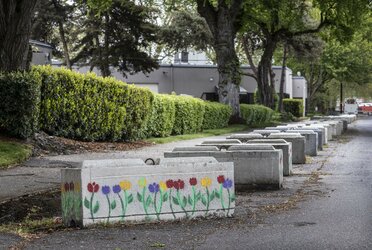
Flowers brighten one in a line of ecology blocks on South Homer Street in Seattle’s Georgetown neighborhood in May. People living in RVs are having a harder time finding parking because of the illegally placed barriers. (Steve Ringman / The Seattle Times)
For the last month, Michael Diaz has been living out of a recreational vehicle parked outside Ruby Chow Park, a triangle-shaped field, where planes roar overhead as they fly into the nearby King County International Airport.
Ahead of Memorial Day weekend, the city is asking him and nearly two dozen other RVs parked around the Georgetown park to leave.
Red “no parking” signs have gone up and Joe Ingram, an outreach worker, asked Diaz what he needs to avoid his vehicle getting impounded.
Diaz thought all he needed were some new batteries and gas. But getting the RV to move is one thing, he said, finding a place nearby to park is another.
“Where can we go from here? To the next block? Nope,” he said. “Can’t park there. They got blocks.”
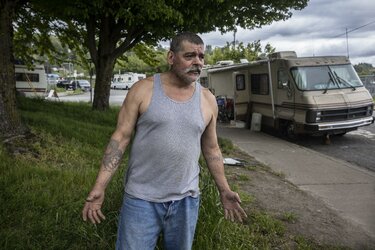
Michael Diaz is among the RV dwellers near Ruby Chow Park in Georgetown who were told they needed to move in May. “Where can we go from here? To the next block? Nope,” he said. “Can’t park there. They got blocks.”(Steve Ringman / The Seattle Times)
These days, a significant portion of public parking in Georgetown has been blocked by large chunks of concrete, between 3 and 6 feet long. The blocks, which are sometimes referred to as “ecology” or “eco” blocks, have been placed anonymously and illegally by people hoping to prevent RVs from parking in front of their homes or business.
Large vehicles cannot park overnight in Seattle unless they are in areas zoned for industrial use, concentrating RV dwellers in a few neighborhoods. Ecology blocks have followed, quietly increasing the last two years in neighborhoods like Georgetown, Ballard and Sodo as the city of Seattle suspended parking enforcement during the pandemic.
But now parking enforcement has resumed, with people living in their vehicles facing fines and the possibility of losing their shelter.
However, enforcement of the growing number of eco-blocks is almost nonexistent.
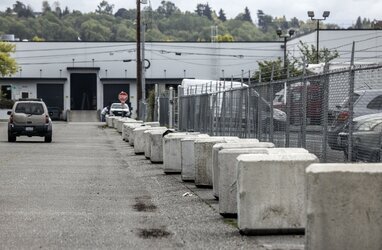
Concrete blocks line South Front Street between Fifth and Sixth avenues south in Seattle’s Georgetown neighborhood in May. One business owner said in his experience, residents and businesses only place ecology blocks because they feel like they have no other choice. (Steve Ringman / The Seattle Times)
Of the hundreds of concrete blocks across Seattle, only 25 unique property and business owners since June 2021 have been warned they could face fines. According to the city, violators could be charged $250 for the first violation, $500 for the second and $1,000 for the third violation, with no limits on the number of fines within a year.
While the department has issued second warnings to some properties, no citations have been issued.
Earlier this year, the transportation department said that it intends to step up enforcement on the rule that vehicles can only be parked on the same block for 72 hours at a time. Since October, the Seattle Department of Transportation has written 4,000 citations and impounded 2,100 vehicles, though the department says it did not impound lived-in vehicles until mid-May.
Homeless advocates say it is not fair that the city expects vehicle dwellers to obey parking laws when it allows businesses to prevent those living in cars from following them by taking up public parking.
“The new mayor ran on a law-and-order platform and this is the law,” said Bill Kirlin-Hackett, the director of the Interfaith Task Force on Homelessness, which runs the Scofflaw Mitigation/Vehicle Residency Outreach Program. “We just find it to be quite hypocritical.”
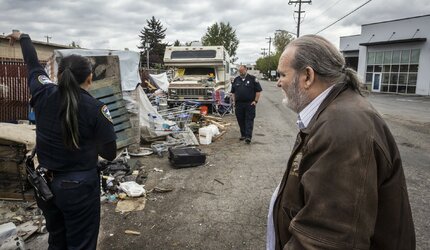
Joe Ingram, right, with the Interfaith Task Force on Homelessness, offers his services to Seattle parking enforcement officers as they place notices on RVs parked in Seattle’s Georgetown neighborhood. Ingram does vehicle residency outreach. (Steve Ringman / The Seattle Times)
The city says the main challenge of responding to complaints about illegal ecology blocks has been identifying who is responsible for them. Because the blocks are placed on public streets, sometimes in the vicinity of multiple properties, it is not always clear who paid for them.
While ecology blocks are typically made with excess concrete and cost around $20 each, each block weighs 1 to 2 tons and cannot be moved without specialized equipment, making it potentially costly or burdensome for the city to remove. The department says it also only responds to ecology blocks through public complaints and does not pay for staff to “continuously patrol the city looking for violations” as it does for parking violations.
“Tow companies have a contract with the city which determines the fees they may charge for an impounded vehicle, but there is not a similar contract when it comes to moving ecology blocks,” SDOT said in a statement.
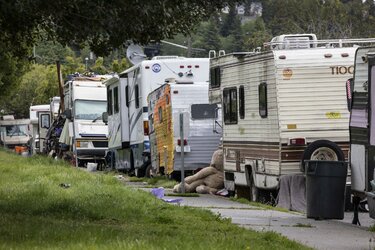
RVs line South Hardy Street next to Ruby Chow Park in Seattle’s Georgetown neighborhood in May. The city told the nearly two dozen RV dwellers they had to move but with parking scarce homeless residents wondered where they could go. (Steve Ringman / The Seattle Times)
Powers, who previously was an outreach worker for the city-funded Scofflaw Mitigation/Vehicle Residency Outreach Program, remembers the stress of trying to find a new parking spot every few days. For around three years, Powers lived out of a 32-foot motor home in Georgetown and regularly moved their vehicle between two or three spaces to avoid impoundment.
Often Powers moved their vehicle at night when the streets were empty, sometimes swapping spots with a nearby friend. Underlying this “shuffle” of vehicles, Powers said, is an overwhelming fear of impoundment, losing your home and all your belongings, as well as harassment from local residents.
Powers said most RV dwellers have found free parking harder to come by because of blocks and no parking signs, so are more reluctant to move unless they are forced to.

A notice from a Seattle parking enforcement officer placed on an RV warns the owner to move the vehicle. Homeless advocates say it is not fair that the city expects vehicle dwellers to obey parking laws when it allows businesses to prevent those living in cars from following them by using public parking. (Steve Ringman / The Seattle Times)

The city of Seattle placed a “no parking” sign in front of this RV located near Seventh Avenue South and South Fidalgo Street in the Georgetown neighborhood in May. The orange sticker indicates when the vehicle will be towed. (Steve Ringman / The Seattle Times)
Businesses often drop the blocks right after Seattle Public Utilities asks RV dwellers to temporarily leave so city workers can clean the area.
The practice is so common that when the city of Seattle removed an RV and homeless encampment along Southwest Andover Street in June, the neighboring West Seattle Health Club made no secret of its plans in a letter to its members.
“To avoid the return of the encampment, the West Seattle Health Club is partnering with our neighboring businesses to place eco-blocks along the surrounding area,” the letter said.
Eco-blocks did appear, but in an email, West Seattle Health Club general manager Chauna Agosto said the gym did not place them after the city recommended against it.
JW Harvey, one of the owners of the Orcas Business Park in Georgetown, said people who judge those who put ecology blocks on the street do not know the reality of living and working near a homeless encampment.
Over the last 10 years, but especially during the pandemic, Harvey said he has spent more time providing water and tools and speaking with the people living on the streets next to his property than he has running his business.
Harvey said he does not want to place ecology blocks around his property because they look bad and take up public parking. However, he’s growing tired of trying to manage the “ripple effects” of the homeless population in his neighborhood.
Every time the city removes an RV encampment and cleans up the garbage, it only takes a few weeks for the sidewalk to return to its former state, he said. Harvey said in his experience, residents and business owners only place ecology blocks because they feel like they have no other choice.
“Individual businesses and residents are putting ecology blocks out as taking matters in their own hands because if they call the city and say there are RVs out in front of their business or out in front of their home, they can’t do anything about it,” he said.
Erin Goodman, executive director of the Sodo Business Improvement Area, said businesses owners are concerned about the safety of their employees or worried about losing their livelihood when they place ecology blocks.
In many parts of Sodo, the rats that RV encampments can sometimes attract can put food manufacturers at risk for losing their license, she said, and fires that start in RVs can damage nearby buildings.
Although the Sodo Business Improvement Area does not recommend people break city rules, Goodman said business owners have been asking for help and are frustrated when they are threatened with citations.
“I don’t think [warnings] are going to deter anybody,” she said. “They’re still going to do it and even for the period of time before the city notices, they get a bit of relief.”

Fremont Brewing’s production facility in Ballard has ecology blocks outside, July 28, 2022, in Seattle. (Ken Lambert / The Seattle Times)
After receiving reports of ecology blocks around the facility, the city issued a warning to the brewery on Sept. 29, 2021, stating that citations or notice of violation could be issued if they were not removed by Nov. 10, according to records obtained by The Seattle Times.
In November, Lincecum emailed a city employee, saying he appreciated “your assurance that the [Department of Transportation] has decided to pause and reconsider how to proceed.” Lincecum said he is looking for “written confirmation that the city of Seattle has paused enforcement of the alleged street use violation for our brewery and the hundreds of other businesses also using ecoblocks,” including a substation in Ballard.
There are also ecology blocks along Northwest 46th Street next to a U.S. post office building.
“As I also reiterated, I do not want Fremont to be in violation of any city codes and have only kept the ecoblocks in place upon the reassurance from you that we are not currently in violation of Seattle City codes,” the email stated.
Lincecum and Nelson declined to comment.
After being asked about the email, the transportation department denied in a statement that it has suspended enforcement and said it has started to send out second warnings when there is not a resolution.
“Our objective is to make sure that we have correctly identified the responsible party and then to work collaboratively with them if they are willing,” the agency said in a statement. “We hope to encourage them to take responsibility for removing the unauthorized obstructions so that we can find a solution that works well for everyone.”
In the meantime, with fewer parking spaces available, RVs are pushed into other neighborhoods or residential streets and are forced to park closer together, forming clusters.
There, they draw more ire.
Garth Caroll, who has lived out of an RV for six years, said the concrete is a physical symbol of the animosity toward homeless people.
“So much of the community has so much built-up hatred against us,” Caroll said. “We’re just trying to fend for ourselves until we can get some permanent housing.”

Ecology blocks line South Homer Street between Padilla Place South and Seventh Avenue South in Seattle’s Georgetown neighborhood in May. It is illegal to place these blocks in public streets, sidewalks or parking spaces, according to the Seattle Department of Transportation. (Steve Ringman / The Seattle Times)
The Seattle Times (archive.ph)
By Amanda Zhou
2022-07-30 15:35:24GMT

Flowers brighten one in a line of ecology blocks on South Homer Street in Seattle’s Georgetown neighborhood in May. People living in RVs are having a harder time finding parking because of the illegally placed barriers. (Steve Ringman / The Seattle Times)
For the last month, Michael Diaz has been living out of a recreational vehicle parked outside Ruby Chow Park, a triangle-shaped field, where planes roar overhead as they fly into the nearby King County International Airport.
Ahead of Memorial Day weekend, the city is asking him and nearly two dozen other RVs parked around the Georgetown park to leave.
Red “no parking” signs have gone up and Joe Ingram, an outreach worker, asked Diaz what he needs to avoid his vehicle getting impounded.
Diaz thought all he needed were some new batteries and gas. But getting the RV to move is one thing, he said, finding a place nearby to park is another.
“Where can we go from here? To the next block? Nope,” he said. “Can’t park there. They got blocks.”

Michael Diaz is among the RV dwellers near Ruby Chow Park in Georgetown who were told they needed to move in May. “Where can we go from here? To the next block? Nope,” he said. “Can’t park there. They got blocks.”(Steve Ringman / The Seattle Times)
These days, a significant portion of public parking in Georgetown has been blocked by large chunks of concrete, between 3 and 6 feet long. The blocks, which are sometimes referred to as “ecology” or “eco” blocks, have been placed anonymously and illegally by people hoping to prevent RVs from parking in front of their homes or business.
Large vehicles cannot park overnight in Seattle unless they are in areas zoned for industrial use, concentrating RV dwellers in a few neighborhoods. Ecology blocks have followed, quietly increasing the last two years in neighborhoods like Georgetown, Ballard and Sodo as the city of Seattle suspended parking enforcement during the pandemic.
But now parking enforcement has resumed, with people living in their vehicles facing fines and the possibility of losing their shelter.
However, enforcement of the growing number of eco-blocks is almost nonexistent.

Concrete blocks line South Front Street between Fifth and Sixth avenues south in Seattle’s Georgetown neighborhood in May. One business owner said in his experience, residents and businesses only place ecology blocks because they feel like they have no other choice. (Steve Ringman / The Seattle Times)
Disproportionate enforcement
It is illegal to place ecology blocks in public streets, sidewalks or parking spaces. Ecology blocks cause “parking spillover into adjacent streets, block utility access and cause other accessibility or transportation problems,” according to the Seattle Department of Transportation.Of the hundreds of concrete blocks across Seattle, only 25 unique property and business owners since June 2021 have been warned they could face fines. According to the city, violators could be charged $250 for the first violation, $500 for the second and $1,000 for the third violation, with no limits on the number of fines within a year.
While the department has issued second warnings to some properties, no citations have been issued.
Earlier this year, the transportation department said that it intends to step up enforcement on the rule that vehicles can only be parked on the same block for 72 hours at a time. Since October, the Seattle Department of Transportation has written 4,000 citations and impounded 2,100 vehicles, though the department says it did not impound lived-in vehicles until mid-May.
Homeless advocates say it is not fair that the city expects vehicle dwellers to obey parking laws when it allows businesses to prevent those living in cars from following them by taking up public parking.
“The new mayor ran on a law-and-order platform and this is the law,” said Bill Kirlin-Hackett, the director of the Interfaith Task Force on Homelessness, which runs the Scofflaw Mitigation/Vehicle Residency Outreach Program. “We just find it to be quite hypocritical.”

Joe Ingram, right, with the Interfaith Task Force on Homelessness, offers his services to Seattle parking enforcement officers as they place notices on RVs parked in Seattle’s Georgetown neighborhood. Ingram does vehicle residency outreach. (Steve Ringman / The Seattle Times)
The city says the main challenge of responding to complaints about illegal ecology blocks has been identifying who is responsible for them. Because the blocks are placed on public streets, sometimes in the vicinity of multiple properties, it is not always clear who paid for them.
While ecology blocks are typically made with excess concrete and cost around $20 each, each block weighs 1 to 2 tons and cannot be moved without specialized equipment, making it potentially costly or burdensome for the city to remove. The department says it also only responds to ecology blocks through public complaints and does not pay for staff to “continuously patrol the city looking for violations” as it does for parking violations.
“Tow companies have a contract with the city which determines the fees they may charge for an impounded vehicle, but there is not a similar contract when it comes to moving ecology blocks,” SDOT said in a statement.

RVs line South Hardy Street next to Ruby Chow Park in Seattle’s Georgetown neighborhood in May. The city told the nearly two dozen RV dwellers they had to move but with parking scarce homeless residents wondered where they could go. (Steve Ringman / The Seattle Times)
Why businesses put blocks down
Dee Powers said that blocks were occasionally placed before the pandemic but have proliferated in the last year while the city was not enforcing the 72-hour parking rule. During that time, RVs stayed put, sometimes accumulating trash and rats, and drew criticism from locals.Powers, who previously was an outreach worker for the city-funded Scofflaw Mitigation/Vehicle Residency Outreach Program, remembers the stress of trying to find a new parking spot every few days. For around three years, Powers lived out of a 32-foot motor home in Georgetown and regularly moved their vehicle between two or three spaces to avoid impoundment.
Often Powers moved their vehicle at night when the streets were empty, sometimes swapping spots with a nearby friend. Underlying this “shuffle” of vehicles, Powers said, is an overwhelming fear of impoundment, losing your home and all your belongings, as well as harassment from local residents.
Powers said most RV dwellers have found free parking harder to come by because of blocks and no parking signs, so are more reluctant to move unless they are forced to.

A notice from a Seattle parking enforcement officer placed on an RV warns the owner to move the vehicle. Homeless advocates say it is not fair that the city expects vehicle dwellers to obey parking laws when it allows businesses to prevent those living in cars from following them by using public parking. (Steve Ringman / The Seattle Times)

The city of Seattle placed a “no parking” sign in front of this RV located near Seventh Avenue South and South Fidalgo Street in the Georgetown neighborhood in May. The orange sticker indicates when the vehicle will be towed. (Steve Ringman / The Seattle Times)
Businesses often drop the blocks right after Seattle Public Utilities asks RV dwellers to temporarily leave so city workers can clean the area.
The practice is so common that when the city of Seattle removed an RV and homeless encampment along Southwest Andover Street in June, the neighboring West Seattle Health Club made no secret of its plans in a letter to its members.
“To avoid the return of the encampment, the West Seattle Health Club is partnering with our neighboring businesses to place eco-blocks along the surrounding area,” the letter said.
Eco-blocks did appear, but in an email, West Seattle Health Club general manager Chauna Agosto said the gym did not place them after the city recommended against it.
JW Harvey, one of the owners of the Orcas Business Park in Georgetown, said people who judge those who put ecology blocks on the street do not know the reality of living and working near a homeless encampment.
Over the last 10 years, but especially during the pandemic, Harvey said he has spent more time providing water and tools and speaking with the people living on the streets next to his property than he has running his business.
Harvey said he does not want to place ecology blocks around his property because they look bad and take up public parking. However, he’s growing tired of trying to manage the “ripple effects” of the homeless population in his neighborhood.
Every time the city removes an RV encampment and cleans up the garbage, it only takes a few weeks for the sidewalk to return to its former state, he said. Harvey said in his experience, residents and business owners only place ecology blocks because they feel like they have no other choice.
“Individual businesses and residents are putting ecology blocks out as taking matters in their own hands because if they call the city and say there are RVs out in front of their business or out in front of their home, they can’t do anything about it,” he said.
Erin Goodman, executive director of the Sodo Business Improvement Area, said businesses owners are concerned about the safety of their employees or worried about losing their livelihood when they place ecology blocks.
In many parts of Sodo, the rats that RV encampments can sometimes attract can put food manufacturers at risk for losing their license, she said, and fires that start in RVs can damage nearby buildings.
Although the Sodo Business Improvement Area does not recommend people break city rules, Goodman said business owners have been asking for help and are frustrated when they are threatened with citations.
“I don’t think [warnings] are going to deter anybody,” she said. “They’re still going to do it and even for the period of time before the city notices, they get a bit of relief.”

Fremont Brewing’s production facility in Ballard has ecology blocks outside, July 28, 2022, in Seattle. (Ken Lambert / The Seattle Times)
Where city stands on enforcement
Fremont Brewing’s production facility in Ballard has become a particularly criticized example of ecology blocks. The beer company is owned by Seattle City Councilmember Sara Nelson and her husband Matt Lincecum.After receiving reports of ecology blocks around the facility, the city issued a warning to the brewery on Sept. 29, 2021, stating that citations or notice of violation could be issued if they were not removed by Nov. 10, according to records obtained by The Seattle Times.
In November, Lincecum emailed a city employee, saying he appreciated “your assurance that the [Department of Transportation] has decided to pause and reconsider how to proceed.” Lincecum said he is looking for “written confirmation that the city of Seattle has paused enforcement of the alleged street use violation for our brewery and the hundreds of other businesses also using ecoblocks,” including a substation in Ballard.
There are also ecology blocks along Northwest 46th Street next to a U.S. post office building.
“As I also reiterated, I do not want Fremont to be in violation of any city codes and have only kept the ecoblocks in place upon the reassurance from you that we are not currently in violation of Seattle City codes,” the email stated.
Lincecum and Nelson declined to comment.
After being asked about the email, the transportation department denied in a statement that it has suspended enforcement and said it has started to send out second warnings when there is not a resolution.
“Our objective is to make sure that we have correctly identified the responsible party and then to work collaboratively with them if they are willing,” the agency said in a statement. “We hope to encourage them to take responsibility for removing the unauthorized obstructions so that we can find a solution that works well for everyone.”
In the meantime, with fewer parking spaces available, RVs are pushed into other neighborhoods or residential streets and are forced to park closer together, forming clusters.
There, they draw more ire.
Garth Caroll, who has lived out of an RV for six years, said the concrete is a physical symbol of the animosity toward homeless people.
“So much of the community has so much built-up hatred against us,” Caroll said. “We’re just trying to fend for ourselves until we can get some permanent housing.”

Ecology blocks line South Homer Street between Padilla Place South and Seventh Avenue South in Seattle’s Georgetown neighborhood in May. It is illegal to place these blocks in public streets, sidewalks or parking spaces, according to the Seattle Department of Transportation. (Steve Ringman / The Seattle Times)